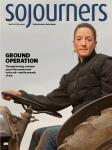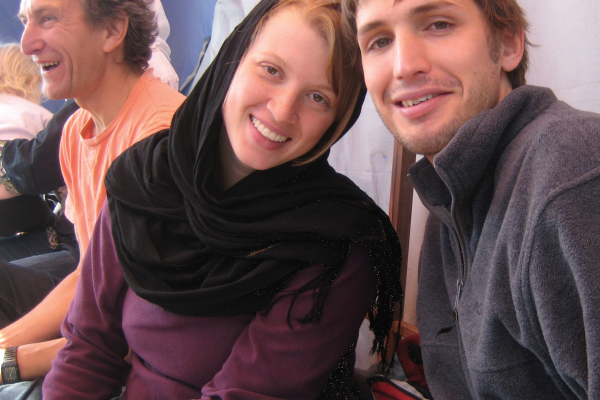Bio: Kelly and Peter Shenk Koontz spent the last three years serving in Kabul, Afghanistan, through a Mennonite Central Committee partner.
Website: MCC.org
1. What work were you doing in Afghanistan?
We worked with a Mennonite Central Committee (MCC) partner in Kabul as Peacebuilding Project Managers. Our job was to integrate peacebuilding within different sectors of the partner organization, including adult education, community development, and many others. Day-to-day, this primarily meant developing curriculum and planning and conducting trainings for a variety of contexts—including rural community development teams and university students in Kabul.
2. How would you summarize the biggest challenges in Afghanistan today?
3. What’s the situation for women and girls there?
The gender dynamics and freedom for women change so much depending on the particular area in Afghanistan and the particular family or community that the women and girls come from. In Kabul and other urban areas of Afghanistan, things have opened up for women, as many more girls are attending school and many young women are going on to higher education. In rural areas, there are fewer opportunities for girls to go to school. There, the culture is much more conservative, which can be seen through dress (nearly all women wear burqas outside of the home), as well as school attendance (the number of girls in school is much lower).
4. What lessons would you offer Christians and faith-based groups doing bridge work with Muslims?
The first thing we would do is reiterate the importance of what [the local people] are doing. In a place like Afghanistan, where nearly all the country is Muslim, it was so important to have conversations with Afghans. There are many negative stereotypes and images portrayed in the media on both sides [Christian and Muslim], and simply having conversations with one another was eye-opening for all of us. Fundamental to the whole process was listening to each other’s stories and answering each other’s questions without trying to change the other person’s mind or argue with them.
5. What surprised you about serving in Afghanistan?
In some ways, Afghanistan is a difficult place to live and work due to the ongoing war, violence, and conservative culture. At the same time, Afghanistan is a beautiful country with amazing and resilient people. What struck us—at least in Kabul—was how normal life was. People work hard to support their families and build a brighter future for their children. Schoolgirls walk in groups and laugh on their way home from school. Schoolboys play soccer on the streets. Vendors sell fruit and vegetables in the bazaar, and ice cream sellers push carts with music playing through the dusty streets. People in Afghanistan and people in the U.S. are more similar than you might think.
6. What is your greatest fear and hope for Afghanistan?
Our greatest fear would be that the current situation would get worse and ethnic divisions would turn into civil war, similar to the mid-1990s in Afghanistan. However, our hope—and belief—is that Afghanistan will find stability and peace. We hope for a negotiated settlement with the armed opposition that takes into account the concerns of human rights groups. We hope for sustainable development and job creation in a country that is still one of the poorest in the world. We hope and pray for a future generation of Afghans that will grow up in a country where war is a thing of the past.
—Interview by Rebecca Kraybill

Got something to say about what you're reading? We value your feedback!
